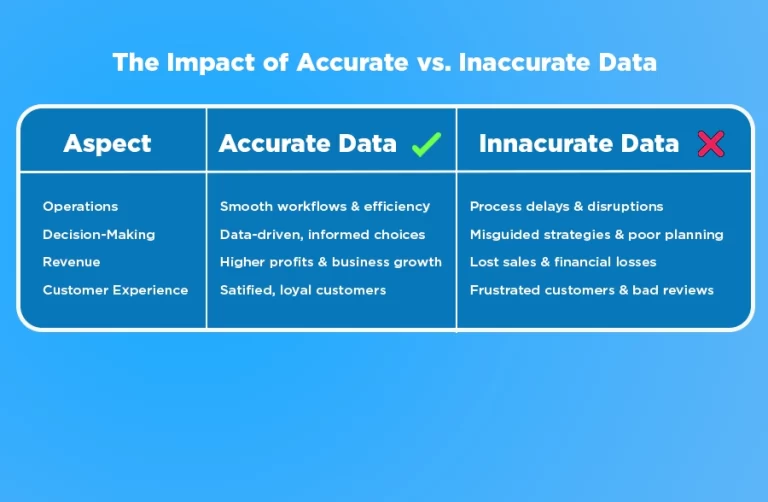Schedule a FREE call with our outsourcing expert now and get a precise quotation that meets your requirements. Don't wait - get started today!
Every business decision relies on data—whether it’s processing customer transactions, managing financial records, or tracking inventory. But what happens when that data is incorrect? A single misplaced digit can delay shipments, overcharge customers, or even trigger compliance violations. Without accuracy, businesses waste time, lose revenue and damage their reputation.
Reliable data isn’t just about the organization—it’s the backbone of operational success. From seamless customer interactions to strategic decision-making, businesses that prioritize data accuracy gain a competitive edge. Let’s explore why accuracy in data is not just important but essential for long-term business growth.
A. Accuracy in Data: The Foundation of Business Success
Reliable data makes a big difference in how businesses run. Without it, companies struggle with decision-making, compliance, and customer management, leading to unnecessary problems.
Every transaction, customer detail, and financial record depends on accurate data to keep operations smooth. Even small errors can cause confusion, wasted time, and legal trouble.
Why Accuracy Matters
Accurate data entry helps businesses avoid costly mistakes in financial records and customer information. Keeping data correct reduces errors that can slow down operations and create financial issues.
When data is accurate:
- Businesses run smoothly without confusion or delays. Clear and correct records help teams work together and prevent misunderstandings that can disrupt daily tasks.
- Customer satisfaction improves with easy and error-free transactions. When orders, payments, and service details are correct, customers have a better experience and trust the business more.
- Following industry rules becomes easier, reducing legal risks. Keeping accurate records helps businesses meet regulations and avoid fines or penalties.
On the other hand, inaccurate data can lead to:
- Errors in invoices that cause wrong or late payments. Incorrect billing details can lead to payment delays, financial losses, and frustrated clients.
- Misdirected shipments that result in lost sales and unhappy customers. A small mistake in an address or tracking number can lead to delays, returns, and a damaged reputation.
- Compliance failures that bring fines and hurt a company’s image. Wrong or incomplete data can make a business fail inspections or audits, leading to serious consequences.
Maintaining accurate data is not just about organization—it protects businesses from costly errors, improves customer experiences, and supports long-term success.
Mistakes in data entry can cause serious problems for businesses, leading to lost revenue, inefficiencies, and poor decision-making. Some of the most common errors include:
- Duplicate records create confusion and slow down database management. When the same data appears multiple times, it can lead to inconsistencies, wasted storage space, and difficulty in tracking accurate information.
- Misspellings and typographical errors lead to incorrect addresses, lost orders, or even legal issues. A simple mistake in a customer’s name or address can result in failed deliveries, billing errors, and compliance problems.
- Misclassification of data distorts reports and analytics, causing poor business decisions. When information is placed in the wrong category, it can lead to inaccurate forecasting, misleading trends, and ineffective strategies.
How Quality Control Measures Improve Accuracy
To maintain accurate data, businesses rely on various quality control measures to detect and prevent errors. These methods help ensure data reliability and reduce costly mistakes.
- Double-entry verification ensures accuracy by cross-checking inputs. This process involves entering the same data twice and comparing both versions to catch discrepancies before they cause issues.
- Automated validation tools detect and correct inconsistencies in real-time. These tools scan data for missing or incorrect values, flagging errors before they impact business operations.
- Hiring trained professionals reduces errors and improves overall data accuracy. Skilled data entry specialists have the expertise to spot inconsistencies, follow industry standards, and apply best practices for precise record-keeping.
The Cost of Poor Data Quality
According to research, businesses lose up to 30% of revenue due to poor data quality. Inaccurate data can lead to billing mistakes, compliance violations, and wasted resources. By investing in high-quality data entry services, businesses can protect their revenue, enhance operational efficiency, and make smarter decisions based on reliable information.

B. Data Security and Compliance: Protecting Business Information
Mishandled or inaccurate data can expose businesses to security risks, legal issues, and financial losses. Errors in data entry may lead to unauthorized access, identity theft, or breaches that compromise sensitive information. Quality data entry services help businesses comply with industry regulations while safeguarding valuable data.
When a security breach occurs, it can severely damage a company’s reputation, causing customers to lose trust and resulting in financial penalties that may take years to recover from.
Why Data Security Should Be a Priority
Protecting business data is critical in today’s digital environment. Companies handle large amounts of sensitive customer and corporate information daily, making data security a top concern.
- Protects sensitive customer and company information from unauthorized access. Without strong security measures, hackers and internal threats can steal valuable data, leading to identity theft and financial fraud.
- Reduces risks of cyberattacks and data theft. Cybercriminals target weak security systems to exploit confidential information, which can disrupt business operations and lead to significant financial losses.
- Ensures compliance with regulations such as GDPR and HIPAA, preventing legal issues. Regulatory bodies impose strict data protection laws, and failure to comply can result in heavy fines, legal actions, and loss of business credibility.
Measures to Keep Data Secure
To prevent security threats, businesses must implement strict security protocols that protect sensitive information from unauthorized access or cyberattacks.
- Role-based access control limits data access to authorized personnel only. By assigning access privileges based on job roles, companies can prevent unnecessary exposure of sensitive information and reduce insider threats.
- Encryption techniques convert sensitive data into unreadable formats for unauthorized users. Encrypting data ensures that even if hackers gain access, they cannot use or interpret the stolen information.
- Regular audits identify vulnerabilities and ensure compliance with security standards. Frequent security assessments help detect weaknesses in data protection strategies and allow companies to address potential threats before they escalate.
The Cost of Data Breaches
C. Speed and Efficiency: Enhancing Business Operations
Timely and accurate data entry ensures smooth business operations, helping companies maintain efficiency and stay ahead of competitors. When data processing is slow, it causes delays in decision-making, customer service, and overall workflow. These inefficiencies lead to missed opportunities, revenue loss, and customer dissatisfaction.
Businesses that prioritize speed in data entry can reduce operational bottlenecks, improve service delivery, and enhance productivity across departments.
How Speed Impacts Business Performance
Fast data entry plays a crucial role in improving overall business efficiency. Companies that process information quickly can respond to market demands, customer needs, and internal operations more effectively.
- Quicker order processing leads to better customer satisfaction. When orders are recorded and processed without delays, customers receive their products or services on time, increasing trust and loyalty.
- Improved record-keeping streamlines internal operations. Fast and accurate data entry ensures that all business records, from financial transactions to inventory management, are up-to-date and easily accessible.
- Real-time data updates allow businesses to make timely decisions. Companies rely on accurate, up-to-date data to make informed choices, preventing costly mistakes and improving overall strategy execution.
Techniques to Improve Data Entry Speed
Businesses can implement various strategies to enhance data entry speed while maintaining accuracy and consistency.
- Optical Character Recognition (OCR) converts scanned documents into editable text, reducing manual entry time. OCR technology automates data extraction, allowing businesses to process large amounts of information quickly and efficiently.
- Standardized data entry formats ensure consistency and minimize errors across records. By using predefined templates and input structures, companies reduce inconsistencies and improve data accuracy.
- Batch processing groups large data volumes for efficient handling and workload reduction. Instead of entering data one record at a time, businesses process multiple entries simultaneously, significantly increasing efficiency and reducing manual labor.
By leveraging these techniques, companies can optimize their data entry processes, minimize delays, and improve overall business performance.
D. Customizable Data Entry Solutions for Business Needs
Every business has unique data entry requirements, depending on industry, workflow, and data complexity. Customizable solutions ensure that companies receive services that align with their specific needs, improving efficiency and accuracy.
As industries evolve, businesses must adapt their data management strategies to maintain operational effectiveness and meet changing demands. Flexible data entry solutions provide scalability and precision, making them essential for long-term success.
Why Customization Matters
Tailored data entry services help businesses manage information more effectively by accommodating their unique operational requirements. A one-size-fits-all approach does not work for industries with specialized data handling needs.
- Adaptability to different industries and data formats ensures seamless integration. Businesses work with various data types, from numerical financial records to text-based customer information, requiring customized entry processes.
- Industry-specific handling optimizes accuracy and compliance. Healthcare providers, for example, must manage patient records with strict confidentiality, while e-commerce businesses focus on accurate inventory tracking.
- Solutions that address specialized challenges improve efficiency. Companies dealing with multilingual data, high-volume transactions, or complex reporting structures benefit from tailored data entry systems that meet their unique challenges.
Types of Custom Data Entry Services
Businesses can choose from different approaches to match their data processing needs. The right method depends on factors like data complexity, industry regulations, and workflow requirements.
- Manual vs. automated data entry: Manual entry is ideal for unstructured data that requires human judgment, while automation accelerates the processing of structured, high-volume data.
- Industry-specific processing: Different sectors, such as finance, healthcare, and retail, require specialized data handling to meet regulatory and operational standards.
- Real-time vs. batch data entry: Real-time processing updates records instantly, making it useful for businesses with continuous data inflow, whereas batch processing handles large datasets more efficiently for scheduled updates.
How Customization Improves ROI
Investing in tailored data entry solutions allows businesses to enhance efficiency, reduce costs, and improve overall performance. A strategic approach to data management leads to long-term financial benefits.
- Minimizing unnecessary costs by streamlining data management prevents wasted resources. Businesses eliminate redundant processes and optimize workflows to reduce operational expenses.
- Lower error rates improve decision-making and compliance. Industry-specific best practices ensure that data is accurate, preventing costly mistakes and regulatory penalties.
- Increased productivity enhances business growth. Automating repetitive tasks and reducing manual workloads enable employees to focus on higher-value activities, improving efficiency and profitability.
By implementing customized data entry solutions, businesses can maximize their return on investment while ensuring accuracy, security, and scalability in their data management processes.
Transform Data into Business Growth
Book your FREE 60-minute business consultation today and discover how accurate data entry can optimize your operations. No commitments—just expert insights to help you work smarter. At Magellan Solutions, we provide comprehensive data entry services, including manual and automated data input, to handle large datasets with precision. We also offer data cleansing and validation to eliminate errors, ensuring data integrity.
Our team specializes in data processing and management, helping you organize and secure critical business information. Additionally, we convert physical documents into digital assets through OCR and data conversion solutions. If you’re looking to outsource data entry Philippines, we deliver secure, scalable, and cost-effective solutions tailored to your needs. Get started today!
















